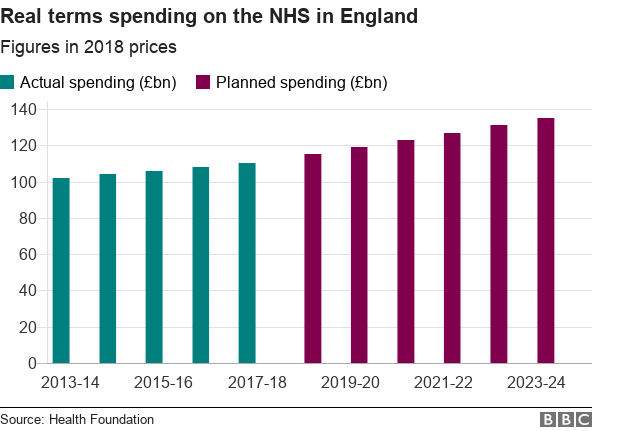NHS funding: Is the boost worth £84bn or £20bn?
- Published

Back in the summer, Prime Minister Theresa May announced that NHS England's budget would increase by £20.5bn by 2023, external. This was confirmed in Philip Hammond's Budget but, speaking on BBC Radio 4's Today programme, the chancellor said the NHS was getting an £84bn boost.
"Don't forget we already made another promise back in June... to put £84bn into our National Health Service," he told the BBC.
So which is it: £20.5bn or £84bn?
Well the answer - somewhat confusingly - is that both figures refer to the same thing, but they are based on different calculations.
Let's start with the £20.5bn figure
The figure of £20.5bn is simply the difference between this year's NHS England budget and what the government says it will be in 2024 once inflation is taken into account - as shown in the government's NHS funding document, external published in June.

This works out as a 3.4% a year increase, on average, over the next five years.
But what about the £84bn figure?
The chancellor, on the other hand, has taken each annual increase and added it up year by year to arrive at a much larger figure (ie it's cumulative).
But that alone doesn't get you to £84bn.
He's also included the extra funding settlements for Scotland, Wales and Northern Ireland, as part of the Barnett formula.
The Barnett formula is used to decide how much devolved governments will receive when funding is increased in areas such as health and education in England.
Furthermore, the chancellor has also included an increase in NHS pension funding (worth up £1.2bn a year from 2019) in his calculations.
By putting all the extra numbers together, you get a table like this:

Source: Budget 2018
Adding up all the additional NHS annual spend over the next five years gets you to the cumulative £84bn figure cited by the chancellor (or £83.58bn to be precise).
This is confirmed in the main Budget document, known as the red book:
"£20.5bn more a year in real terms by 2023-24... with a total UK-wide scorecard cost of £83.6bn."
But some argue the Treasury's method is not a typical accounting procedure, among them is David Maguire, policy analyst, at the King's Fund think tank:
"Normally you take the starting point and compare it with the end point," he says.
"And to have different numbers (£20.5bn and £84bn), it makes it harder for the public to understand what's happening."
The Treasury disagrees. It says the £84bn figure is clearly set out in the Budget scorecard and it stresses that both figures are correct.


